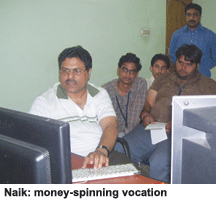With the Indian film industry having emerged as the largest in the world and the citizenry being offered the choice of over 515 television channels, professionally qualified film editors are much sought after
The most glamorous career options in India’s multi-billion dollar movies, film and television industries dominated by ‘Bollywood’ are in mainstream acting or direction. However, the film and television industry also has plenty of less glamorous but interesting and creative career avenues such as editing, a critical component of film production. That’s why countrywide, ambitious youth of both sexes are flocking to film institutes to study the specialised art of film editing.
A professional film editor is an expert in the art of ‘cutting’. Editors work in studios, view footage shot by the directors to fine tune audio-visual output, and use their skills to mix, or glide smoothly between the narrative sequence and music so that it makes sense and appeals to audiences. Narrative skills and thorough understanding of the script and screenplay to add depth or compress footage, are required of a competent editor. And apart from inherent creativity, proficiency in the editing software application Final Cut Pro (FCP) is mandatory.
With industry demand for prof-essionally qualified film editors rising continuously, most film institutes offer certificate, diploma and postgraduate programmes. The minimum admission qualification required is Plus Two, but collegiate graduation is required for admission into postgraduate diploma courses in film editing offered by government-aided institutes. Admission is either through an entrance exam and/or interview.
Among the prominent institutes offering film editing study programmes are the Central government’s Film & Television Institute of India (FTII), Pune which offers a full-time three-year postgraduate diploma in film editing; Satyajit Ray Film and Television Institute, Kolkata — a three-year postgrad diploma in film and television with an option to specialise in editing in the second and third years; Whistling Woods International, Mumbai — a two-year full-time diploma in film editing and other specialisations and a four-week short-term programme in editing skills and FCP; Flash Frame Visuals Academy of Film & Video Editing, Bangalore which conducts short part-time diploma courses in professional editing, and Digital Academy, Mumbai offers short-term courses of six months duration in non-linear editing.
With the Indian film industry having emerged as the largest in the world producing over 1,000 feature films per year with an annual turnover of Rs.6,000 crore, and the citizenry being offered the choice of over 515 television channels, professional film editors are much sought after, and demand will keep rising in years to come. Competent profess-ionals have the option of working in feature and non-feature films, docum-entaries, ad films, and television. It’s a money-spinning vocation and once you’ve carved a niche for yourself, the sky is the limit.
 “India’s film and television industry is growing continuously and we anticipate enough jobs for qualified professionals. With the onset of the digital revolution, opportunities in this field have multiplied. The number of applicants for admission into film editing programmes at Whistling Woods is rising every year,’’ says Prashant Naik, winner of the national award of the Union government for best editing in the non-feature films category in 2005, and currently head of the department of editing at Whistling Woods International, Mumbai.
“India’s film and television industry is growing continuously and we anticipate enough jobs for qualified professionals. With the onset of the digital revolution, opportunities in this field have multiplied. The number of applicants for admission into film editing programmes at Whistling Woods is rising every year,’’ says Prashant Naik, winner of the national award of the Union government for best editing in the non-feature films category in 2005, and currently head of the department of editing at Whistling Woods International, Mumbai.
A commerce and law postgrad of Sambalpur University, Naik was admitted into the prestigious FTII in 1989 after being rejected several times. After graduation, he moved to Mumbai in 1992, seeking work in the film industry.
“Since video technology was new at the time, I took the opportunity of learning it while working independently and started my professional career editing a corporate promo film. After that the cable television boom of the mid-1990s generated a huge demand for film editors from television serials, game shows, documentaries, ad films and feature film production companies. As a consequence I bagged a high-profile assign-ment as online editor for live telecast of the World Cup cricket match between Australia and India in 1996,’’ reminisces Naik.
Since then he has edited a number of feature films, television serials, corporate films, ad films and documen-taries with I am Kalam, a Hindi feature film edited by him, screened at the Berlin, Cannes and Venice Film festivals in 2010, winning him several awards at the Lucas International Film Festival, Germany last year.
Attracted by the teaching profession, Naik who is also a FCP trainer certified by Apple Inc, served as head of the department of editing at FTII (2004-06) moving to Whistling Woods in 2008. “The media industry, especially film and television has a very bright future in India and worldwide. With films, television, advertising and internet industries all generating massive volumes of content, the demand for professionally qualified, on-the-ball film editors is likely to intensify. It’s a career option with huge opportunities and is well worth considering,” advises Naik.
Cut!
Indra Gidwani (Mumbai)